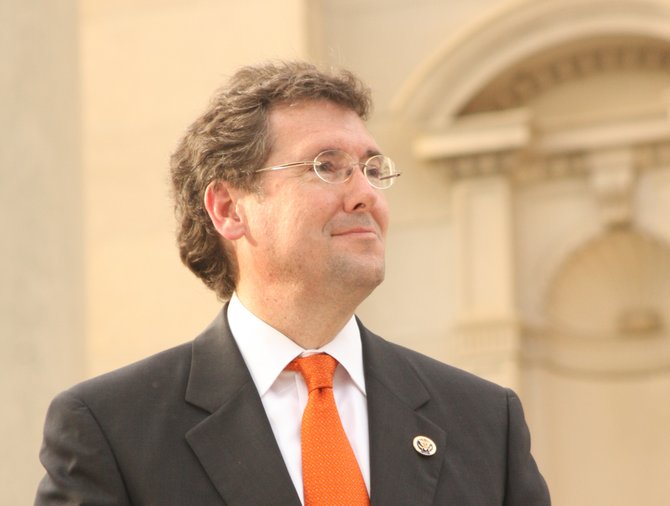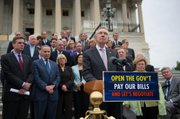WASHINGTON (AP) — The government unlocked office doors, carried away barriers and lifted entrance gates at parks across the country Thursday after a battle-weary Congress approved a bipartisan deal to end 16 days of partial shutdown and guarantee that the United States would pay its debts, at least for this year.
In hopes of averting another standoff early next year when the temporary measure runs out, Congress' four top budget writers met over breakfast Thursday to begin two months of budget talks. It's a tough project, and they offered no promises.
House Budget Committee Chairman Paul Ryan, R-Wis., said the group's goals were "to get this debt under control, to do smart deficit reduction, and to do things that we think will grow the economy and get people back to work."
"We believe there is common ground," Senate Budget Committee Chairman Patty Murray, D-Wash., said afterward.
The House and Senate voted late Wednesday night to end the showdown that began when Republicans tried unsuccessfully to use must-pass funding legislation to derail the president's landmark health care law.
Early Thursday, President Barack Obama signed the measure and directed all agencies to reopen promptly.
The relief felt by furloughed federal employees was tempered by worry that the truce might not last much past the holidays. Congress approved government funding only through mid-January. And the nation's borrowing limit will need another increase shortly after that. In the meantime, lawmakers will try to find agreement on how to replace this year's across-the-board spending cuts with more orderly deficit reduction.
"I hope this is the end of this," said Vice President Joe Biden, who greeted workers returning to the Environmental Protection Agency with hugs, handshakes and muffins. But Biden acknowledged, "There's no guarantees of anything."
The impasse furloughed about 800,000 workers at its peak, before civilian Defense Department employees were called back. It closed down most of NASA, the Environmental Protection Agency and the Interior Department and halted work not considered critical at other agencies.
"We're back from the #shutdown!" the Smithsonian Institution crowed on Twitter, announcing that museums would reopen Thursday. The U.S. Capitol's visitor center planned to resume tours. "Closed" signs started coming down at national parks and offices across the nation, hours after the deal was sealed in Washington.
Congress agreed to pay federal workers for the missed time. No such luck for contractors and all sorts of other workers whose livelihoods were disrupted.
"More business. More money," cab driver Osman Naimyar said happily, noting the growing crowds of commuters on Washington streets. He lost about a fifth of his normal fares while federal workers stayed home and tourists disappeared from the National Mall.
Standard & Poor's estimated the shutdown has taken $24 billion out of the economy, and the Fitch credit rating agency warned Tuesday that it was reviewing its AAA rating on U.S. government debt for a possible downgrade.
Obama and his Democratic allies on Capitol Hill were the decisive winners in the fight, which was sparked by tea party Republicans like Sen. Ted Cruz of Texas. They prevailed upon skeptical GOP leaders to use a normally routine short-term funding bill in an attempt to "defund" the 2010 health care law known as "Obamacare."
"We fought the good fight. We just didn't win," House Speaker John Boehner, R-Ohio, conceded in a radio interview. He was given positive reviews from Republicans for his handling of the crisis, though it again exposed the tenuous grasp he holds over the fractious House GOP conference.
Republican Sen. John McCain of Arizona said the American people disapproved of how Republicans, and also Democrats and the president, handled the budget gridlock.
"Hopefully, the lesson is to stop this foolish childishness," McCain said on CNN.
The shutdown sent approval of the GOP plummeting in opinion polls and exasperated veteran lawmakers who saw it as folly.
"After two long weeks, it is time to end this government shutdown. It's time to take the threat of default off the table," House Appropriations Committee Chairman Harold Rogers, R-Ky., said before the vote. "It's time to restore some sanity to this place."
The agreement was brokered by the Senate's top Democrat, Majority Leader Harry Reid of Nevada, and its Republican leader, Mitch McConnell of Kentucky. They stepped in after the House was unable to coalesce around a Republican-only approach.
McConnell is up for re-election next year, and the tea party opponent he faces in the Republican primary issued a statement blasting him for making the deal.
"When the stakes are highest, Mitch McConnell can always be counted on to sell out conservatives," Matt Bevin said.
In the House, conservatives praised Boehner for being tenacious.
The Senate approved the legislation by an 81-18 vote. The House followed suit by a tally of 285-144, with 87 Republicans in favor and 144 against, breaking an informal policy that a majority of the controlling party should carry legislation. Democrats unanimously supported the bill, even though it locks in funding at levels required by across-the-board spending cuts known as sequestration that they oppose.
The legislation would fund the government through Jan. 15 and permit it to borrow normally through Feb. 7. After that, Treasury Secretary Jacob Lew retains the capacity to employ accounting maneuvers to create wiggle room on the debt limit into mid-March or so.
Most House Republicans opposed the compromise bill for failing to do anything about deficits and debt.
"All this does is delay this fight four months," Rep. Mo Brooks, R-Ala., said. "We need to get to the underlying cause of the problem, which is our out-of-control spending and deficits, and fix it before it's too late and we go down the toilet to bankruptcy because that's where America is headed."
It's the second time this year that Congress has passed legislation to increase the government's borrowing cap with few if any conditions on the president, reversing a 2011 precedent in which the threat of default was used to extract $2.1 trillion in spending cuts from a politically wounded Obama.
Copyright Associated Press. All rights reserved. This material may not be published, broadcast, rewritten, or redistributed.




Comments
Use the comment form below to begin a discussion about this content.